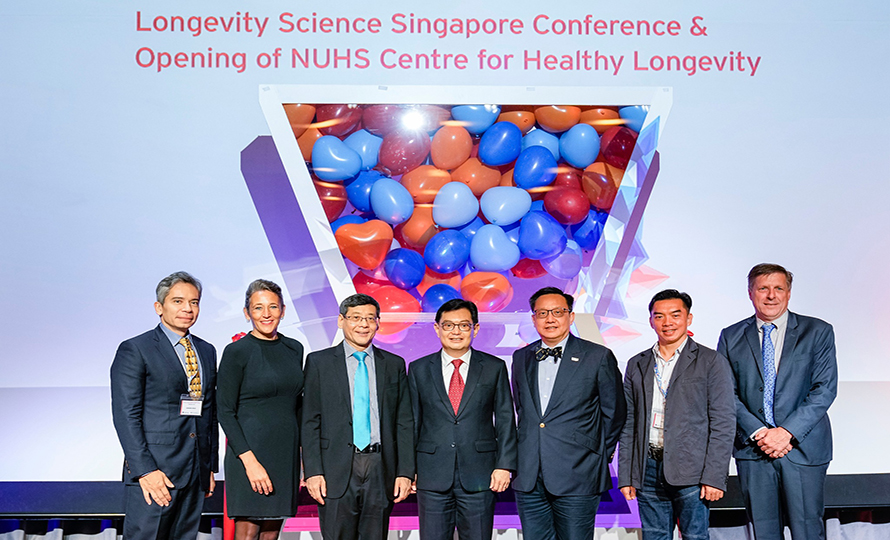Prolonging healthspan by delaying ageing
Published: 08 Sep 2022

Photo Credit: National University Health System
Ageing is the climate change in medical science, where global societies are experiencing a sharp rise in the number of older adults relative to the rest of the population.
Singapore will be the fastest ageing country by 2025, with 25% of its population estimated to be above 65 years old by 2030. Although medical advancements have improved life expectancy among Singaporeans by 8.7 years to 84.8 years, one of the longest in the world; our healthy life expectancy, or healthspan, increased by only 7.2 years to 74.2 years. The grim reality is that Singaporeans are spending about 10 years of their twilight years in poor health. As the gap between life expectancy and health adjusted life expectancy increases, healthcare and caregiving costs will represent an unsustainable socioeconomic burden for society.
On 7 September 2022, the National University Health System (NUHS) established the Centre for Healthy Longevity (CHL)— the world’s first integrated pre-clinical and clinical ageing research institute that is poised to lead the longevity medicine field with clinical research to prolong healthspan by delaying ageing. The ceremony was graced by Deputy Prime Minister and Coordinating Minister for Economic Policies, Mr Heng Swee Keat.
The Centre is also the clinical and translational partner of the Healthy Longevity Translational Research Programme (TRP) at the NUS Yong Loo Lin School of Medicine (NUS Medicine), whose research to slow ageing, and improve healthspan for the broader population has received generous funding ($5 million) from the Lien Foundation.
Termed ‘Hacking Ageing’, the research initiative comprises three broad themes, which will contribute to the creation of an integrated biomarker-artificial-intelligence (AI) platform that will be the world’s first in testing supplements and repurposed drugs combined with lifestyle interventions in the Asian population. This will allow for better early detection, risk stratification and development of personalised, preventive and therapeutic strategies to improve healthspan.
Lee Poh Wah, CEO, Lien Foundation said, “Through the ‘Hacking Ageing’ initiatives, we hope to contribute to the national agenda to shift the healthcare paradigm from the present state of reactive ‘sick care’ towards a population health prevention approach. Socioeconomic factors are often at the root of health inequalities. As a society, we have a moral duty to ensure anti-ageing therapeutics are not confined to the realm of the rich and exacerbate existing disparities. Developing biomarkers and interventions that are accessible to all in the community, is necessary towards narrowing this gap and democratising healthy longevity. A takeaway from our Gym Tonic programme is that seniors want, and can, get strong on their own terms. Healthspan encompasses not just the physical but the cognitive and emotional dimensions too. We need to mainstream longevity science, and arm everyone with the knowledge and tools to extend the period of life spent in good health.”
The Centre is helmed by Prof Brian Kennedy, Distinguished Professor at the Departments of Physiology and Biochemistry at NUS Medicine, and Prof Andrea Britta Maier, Oon Chiew Seng Professor in Medicine, Healthy Ageing and Dementia Research, from the Department of Medicine at NUS Medicine. Prof Brian Kennedy is also from the Healthy Longevity Translational Research Programme at the School.
The 1,600 square feet Centre located at Alexandra Hospital and a laboratory at NUS Medicine, will conduct trials and execute validation studies with healthy participants from the age of 30 years old. The Centre will also develop and test these interventions using newly identified biomarkers of human ageing.
Once the approaches are validated, the Centre will develop strategies that integrate a combination of nutritional, medicinal and exercise approaches for personalised adoption in the Singapore population. The ultimate goal is to bring the individual closer to his/her state of optimal peak performance during the entire lifespan (e.g. screening to start from 30 years of age).

